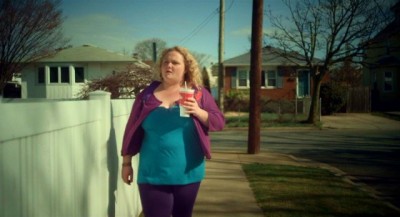| Reviews & Columns |
|
Reviews DVD TV on DVD Blu-ray 4K UHD International DVDs In Theaters Reviews by Studio Video Games Features Collector Series DVDs Easter Egg Database Interviews DVD Talk Radio Feature Articles Columns Anime Talk DVD Savant Horror DVDs The M.O.D. Squad Art House HD Talk Silent DVD
|
DVD Talk Forum |
|
|
| Resources |
|
DVD Price Search Customer Service #'s RCE Info Links |
|
Columns
|
|
|
Every Secret Thing
Every Secret Thing would be a much worse movie if it weren't for director Amy Berg's ability to draw out her characters through her own peculiar social observances. The film is an unimaginative police procedural filled with plot holes, but its actors work hard to create an otherwise believable world that is more interesting than the story they're trapped in. The best part of Every Secret Thing is Danielle Mcdonald's performance as an outcast wracked by the effects of being locked away for contributing to the death of an infant, years earlier. After spending seven years incarcerated as a juvenile, we meet 18 year old Alice, obese, insecure, and eerily aloof in a way that the film never fully develops.
Alice is closer to a more realistic version of the sort of infantile adults that Melissa McCarthy has played in films like Bridesmaids and Tammy. Alice is set adrift in society by her awkward, unconventional appearance and her inability to fit in with a vaguely defined status quo that favors thin bodies and rewards the thoughtlessness that is required, not only by the juvenile hijinks that McCarthy tries to pass off endearingly as comedy, but by the celebrity/reality TV culture that Alice yearns to be part of during the beginning of the film. The movie's underdeveloped mystery plot is far less interesting than seeing how the characters are affected by a murder, years after it has happened, and by McDonald's performance.

By the time the biracial infant of the story suddenly makes her appearance, the film introduces strange motifs involving race relations between black and white people. The doll, the infant who eventually dies at the hands of the two main characters, and a later plot revelation that explains the motivation for the disappearance of a biracial child on the day Alice and Ronnie are released, are given a significance that is never fully justified. All of these elements have the unifying theme of racial tensions between black and white people, but they are treated in a strange, offhanded manner, as though the filmmakers had no idea how to approach such a subject.
After young Alice and Ronnie inexplicably discover a half black, half white baby alone on the front porch of a house, the film fades into the present, the day that the two girls, now 18, are released from a juvenile detention facility after serving seven years for killing the infant.
Immediately after their release, the lives of Alice and Ronnie take different paths. Ronnie finds work in a donut shop, while Alice remains stuck at home, seemingly trapped into her childhood by her mother. Ronnie and Alice are both outcasts, and Berg is given the opportunity to explore the lives of her two main characters through the various social lenses that were probably picked up from her work as a documentary filmmaker. Berg directed the 2013 documentary West of Memphis, which, somewhat redundantly, explored the West Memphis Three case, in which three teenage social outcasts were convicted of the horrendous murders of several young boys based completely on their Heavy Metal/Goth styles of dress, the music they listened to, and the unfounded hysteria surrounding such things, all of which were better explored in the Paradise Lost documentaries. However, having worked with subject matter involving misunderstood youth outcasts, Berg has a talent for showing her odd, damaged characters in a sympathetic way.
The heart of this potboiler mystery are the various small observations that eat away at its mundane surface to reveal odd instances that are reflective of everyday life. While somewhat broad, the clearly marked social around the characters gives Every Secret Thing a sense of real life texture that adds needed depth to the murder mystery plot.
"Wrong side of the tracks" girl Ronnie is played by Dakota Fanning in an understated way, and her poor-girl characterization doesn't condescend. Like many young people forced to fend for themselves, the imperative of survival seems to be the only motivating factor in Ronnie's life. The terse, stricken look Ronnie wears on her face, the tense drags she takes off her cigarettes, age her prematurely. These kinds of observations about Fanning's character inform the kinds of authentic-seeming tics that make the film stand out from less imaginative potboiler mysteries.

Early in the film, 18-year-old Alice is shown yearning for celebrity status and the reality TV spotlight that she believes will redeem her. In a letter read in voiceover, Alice pleads to be allowed on a reality TV show despite her weight, despite the way she looks and despite the clothes she wears, and because, she insists, she was wrongly convicted for a murder she didn't commit. After being placed back into society following her sentence, Alice's first impulse is to find acceptance from the illusions of television and the media, which reject girls with her body type, and which only feeds her desperate need for acknowledgement.
Where Ronnie is driven simply by survival, Alice grasps for acceptance immediately after being released from prison to fill the void left by her mother's rejection. The emptiness of Alice's post-release life are the true, utterly depressing heart of the kinds of behavior overweight actors have been forced to externalize in demeaning ways. Alice's yearning for acceptance from the shallow reality TV world shows the level of buffoonery that overweight actors are forced to lower themselves to in order to gain acceptance in their profession. The character of Alice and her portrayal as an overweight desperate loner have been made possible by, and informed by, the relatively recent acceptance of actors with fuller or even obese figures. From Gabourey Sidibe in the grimly depressing Precious, to Melissa McCarthy in her recent immature, puerile roles as socially maladjusted adult imbeciles in films like Tammy, overweight actresses have been given inroads into acting based on the condition that they play off of their physical appearances in grotesque and comical ways, no matter how sympathetic or nuanced their performances are intended to be. As a performer, McDonald would have easily fallen into a trap filled with many of the cliched representations of overweight people that have been seen on screen in recent years, but Berg's direction allows room for the kinds of odd character traits and peculiar observations that almost saves Every Secret Thing from its vague, poorly executed story.
Alice's actions and demeanor suggest arrested emotional and mental development that hinders her in the outside world. Treated realistically, the kind of juvenile pathos informed by Melissa McCarthy's body shape would reveal people who are seriously, irrevocably, unable to conduct themselves normally in the outside world. McDonald's performance is a slight improvement on these representations because the effects of this inability to behave and cope normally are not treated in a comical, or demeaning way, which has been the case in other films.
Upon her release, Alice wanders the streets without purpose, always alone, a Big Gulp in one hand, just drifting. This subtly haunting image sums up Alice's fate, but first you must realize the relatively sympathetic point of view that Berg takes in portraying a young person affected by horrendous crimes. It's just too bad Alice doesn't exist in a more interesting film.
The DVD:
Video:The movie has a dreary, low-light visual style that gives the world the movie creates a real-life texture. This visual approach works for the film, and compliments the realist elements of the two leading actresses. The film was shot in a 1.85:1 aspect ration and is in good proportion with the small scale, character-driven nature of Every Secret Thing. The muted colors, grey skies, and lived-in interiors look banal on screen, but have their own visual appeal.
Audio:Like the video, the sound is good, but not flashily innovative, which again, works well for the overall viewing experience. The Dolby Digital 5.1 track is in English, but there are also Spanish subtitles and titles for the hearing impaired. The sound design isn't particularly complicated, but the distribution of all the sound effects, dialogue, music and diegetic sounds are all spread in a way that creates a nicely dimensional sound mix.
Extras: The only special features are a handful of deleted scenes running seven minutes total, and not adding much to the viewing experience of the actual film. As all deleted scenes go, they are extraneous and add nothing to the finished film. There is a scene where Alice gets a job as a babysitter, and an extended dialogue scene that goes on for far too long.
Final Thoughts:
Every Secret Thing is a film that only works because of director Amy Berg's ability to handle social outcasts in a sympathetic way, which has also been seen in her documentary work about the West Memphis Three. Without strong performances that have small, sublime moments that rise above the rest of the film's pedestrian nature, Every Small Thing would have few engaging moments, since its mundane plot gives nothing new or interesting.
|
| Popular Reviews |
| Sponsored Links |
|
|
| Sponsored Links |
|
|
| Release List | Reviews | Shop | Newsletter | Forum | DVD Giveaways | Blu-Ray | Advertise |
|
Copyright 2024 DVDTalk.com All Rights Reserved. Legal Info, Privacy Policy, Terms of Use,
Manage Preferences,
Your Privacy Choices | |||||||













